
Related
Topics
Guests
- Cornel Westprofessor of the practice of public philosophy at Harvard University.
- Maria Hinojosaaward-winning journalist, author and founder of Futuro Media.
One of the most remarkable moments from Wednesday’s inauguration ceremony came from poet Amanda Gorman, the youngest poet in U.S. history to speak at a presidential inauguration. The 22 year-old read “The Hill We Climb,” a poem she finished right after the riot at the Capitol earlier this month. We feature her full recitation and get reaction from scholar Cornel West and award-winning journalist Maria Hinojosa.
More from this Interview
- Part 1: “Democracy Has Prevailed”: Joe Biden Sworn In as President; Kamala Harris Becomes First Female VP
- Part 2: “The Work Continues”: Cornel West & Maria Hinojosa on the Promise & Dangers of the Biden Admin
- Part 3: “The Hill We Climb”: Watch Breathtaking Poem by Amanda Gorman, Youngest Inaugural Poet in U.S. History
Transcript
AMY GOODMAN: This is Democracy Now!, democracynow.org, The Quarantine Report. I’m Amy Goodman, with Nermeen Shaikh.
One of the most remarkable moments of Wednesday’s inaugural ceremony came from the inaugural poet, Amanda Gorman of Los Angeles. She’s the youngest poet in U.S. history to address a presidential inauguration. She became the youth poet laureate of Los Angeles at the age of 16 in 2014 and then the first national youth poet laureate. The 22-year-old poet read her poem “The Hill We Climb.” She finished it right after the riot at the Capitol earlier this month. Her words captured the nation. This is Amanda Gorman.
AMANDA GORMAN: Mr. President, Dr. Biden,
Madam Vice President, Mr. Emhoff,
Americans, and the World:
When day comes, we ask ourselves:
Where can we find light
In this never-ending shade?
The loss we carry, a sea we must wade.
We’ve braved the belly of the beast.
We’ve learned that quiet isn’t always peace,
And the norms and notions of what “just is”
Isn’t always justice.
And yet the dawn is ours before we knew it.
Somehow, we do it.
Somehow we’ve weathered and witnessed
A nation that isn’t broken, but simply
unfinished.
We, the successors of a country and a time
Where a skinny Black girl,
Descended from slaves and raised by a
single mother,
Can dream of becoming president,
Only to find herself reciting for one.
And yes, we are far from polished,
far from pristine.
But that doesn’t mean we are striving to
form a union that is perfect.
We are striving to forge our union with
purpose,
To compose a country committed
To all cultures, colors, characters,
And conditions of man.
And so we lift our gazes not
To what stands between us,
But what stands before us.
We close the divide,
Because we know to put
Our future first, we must first
Put our differences aside.
We lay down our arms
So we can reach out our arms to one
another.
We seek harm to none, and harmony for all.
Let the globe, if nothing else, say this is true:
That even as we grieved, we grew,
That even as we hurt, we hoped,
That even as we tired, we tried.
That we’ll forever be tied together.
Victorious,
Not because we will never again know
defeat,
But because we will never again sow
division.
Scripture tells us to envision that:
“Everyone shall sit under their own vine
and fig tree,
And no one shall make them afraid.”
If we’re to live up to our own time, then
victory
Won’t lie in the blade, but in all the bridges
we’ve made.
That is the promised glade,
The hill we climb, if only we dare it:
Because being American is more than
a pride we inherit—
It’s the past we step into, and how we
repair it.
We’ve seen a force that would shatter our
nation rather than share it,
Would destroy our country if it meant
delaying democracy.
And this effort very nearly succeeded.
But while democracy can be periodically
delayed,
It can never be permanently defeated.
In this truth, in this faith, we trust.
For while we have our eyes on the future,
History has its eyes on us.
This is the era of just redemption.
We feared at its inception.
We did not feel prepared to be the heirs
Of such a terrifying hour.
But within it we’ve found the power
To author a new chapter,
To offer hope and laughter to ourselves.
So while once we asked: How could we
possibly prevail over catastrophe?
Now we assert: How could catastrophe
possibly prevail over us?
We will not march back to what was,
But move to what shall be:
A country that is bruised but whole,
Benevolent but bold,
Fierce and free.
We will not be turned around,
Or interrupted by intimidation,
Because we know our inaction and inertia
Will be the inheritance of the next
generation.
Our blunders become their burdens.
But one thing is certain:
If we merge mercy with might, and might
with right,
Then love becomes our legacy,
And change, our children’s birthright.
So let us leave behind a country better
than the one we were left.
With every breath from my bronze-
pounded chest,
We will raise this wounded world into
a wondrous one.
We will rise from the gold-limned hills
of the West!
We will rise from the windswept
Northeast, where our forefathers first
realized revolution!
We will rise from the lake-rimmed cities
of the Midwestern states!
We will rise from the sunbaked South!
We will rebuild, reconcile, and recover,
In every known nook of our nation,
In every corner called our country,
Our people, diverse and dutiful.
We’ll emerge, battered and beautiful.
When day comes, we step out of the
shade,
Aflame and unafraid.
The new dawn blooms as we free it,
For there is always light,
If only we’re brave enough to see it,
If only we’re brave enough to be it.
AMY GOODMAN: Twenty-two-year-old Amanda Gorman, the youngest inaugural poet in U.S. history.
This is Democracy Now!, as we end our conversation with Dr. Cornel West, professor of the practice of public philosophy at Harvard University, and award-winning journalist Maria Hinojosa. In the last few minutes we have, Professor West, you were in Charlottesville, Virginia, when the Klan marched, when the white supremacists marched. Amanda was writing her poem through the riot, the white supremacist attack on the Capitol. Your final thoughts?
CORNEL WEST: Just that we say to Brother Biden, you know, when he stood on the floor the Senate, November 18, 1993, and said, “These young Black folk are predators on the street beyond the pale, to be taken out of society,” if you’re going to talk about empathy, you ought to extend your empathy to the cousins of the brilliant, visionary poet Amanda on that street. They’re human beings, even when they’re incarcerated. Extend your sympathy to the immigrants trying to make their way, often coming into a country that used to be theirs, our Mexican brothers. Extend your sympathy to poor, no matter what color, working-class, no matter what color — yes, Jewish folk hated in France, Palestinians hated on the West Bank. Where is your concrete empathy and compassion and acknowledging common humanity?
That’s the kind of pressure that he’s going have to expect from love warriors, freedom fighters,, like both myself and the Amanda Gormans, with memories of Sojourner Truth and Harriet Tubman and Toni Morrison, and John Coltrane’s Love Supreme.
NERMEEN SHAIKH: And, Maria, your final thoughts?
MARIA HINOJOSA: Wow! Just also Frederick Douglass and Ida B. Wells, my founding fathers and founding mothers, right? That’s why we do this.
Look, the only thing that I — and I’m trying to stay inspired. I really am. Because, otherwise, what happens? So, we just have to realize that those of us who have this understanding of what democracy looks like got to deepen it. OK, sometimes you can chill. You’ve got to take a — you know, relax, whatever. I understand. But we deepen it. That’s why I love being on with both you, Amy, who I’ve known for years, and Brother West, is because there’s such a humanity here. And I think that if Joe Biden and Kamala can do something, it would be to actually try to humanize, as Cornel was saying, the brothers and sisters of our dear poet, of Amanda, of so many — right? — to humanize those who were not born here, like myself.
So, this is our challenge. As I tell my students — I’m about to start teaching any minute now at Barnard, and I’ll tell my students: There are some days when you cannot, in fact, be that unifier. So don’t try it on those days. On the days when you can have dialogue, yes. But you know what? At the same time now, maybe this isn’t a time for that right now. Give ourselves a little bit of a break also to take critical pause for what we’re seeing and to understand, finally, we are much stronger than we think. We never thought we could make it this far. But also, we did not all make it. We did not all make it. And so, for that, I’m very sorry.
But I’m looking at the sun, and I’m incredibly hopeful. Nature is what grounds me, and I hope it grounds the both of you, too — the three of you. It’s been such a pleasure to be with all of you.
AMY GOODMAN: We thank you so much for being here on this post-inauguration broadcast, Maria Hinojosa, award-winning journalist, author and professor, and Dr. Cornel West, professor of the practice of public philosophy at Harvard University.
Democracy Now! is produced with Renée Feltz, Mike Burke, Deena Guzder, Libby Rainey, Nermeen Shaikh, María Taracena, Carla Wills, Tami Woronoff, Charina Nadura, Sam Alcoff, Tey-Marie Astudillo, John Hamilton, Robby Karran, Hany Massoud and Adriano Contreras. Our general manager is Julie Crosby. Special thanks to Becca Staley, Miriam Barnard, Paul Powell, Mike Di Filippo, Miguel Nogueira, Hugh Gran, Denis Moynihan, David Prude and Dennis McCormick. Remember, wearing a mask is an act of love. I’m Amy Goodman, with Nermeen Shaikh. Stay safe.

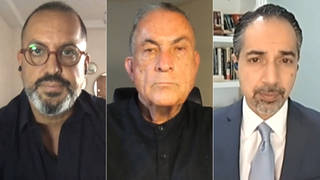
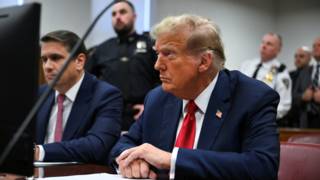
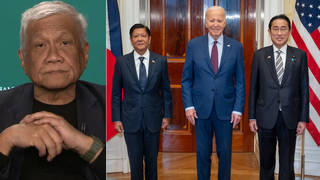
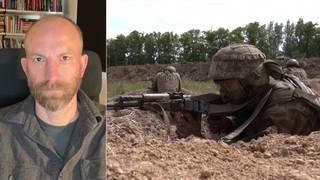





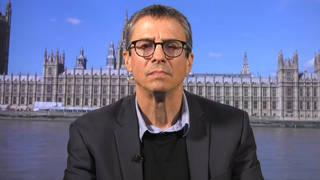
Media Options